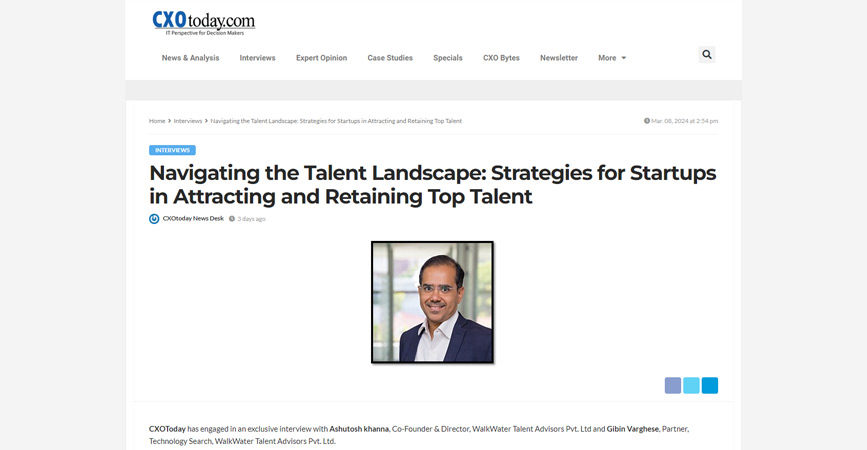
CXOToday has engaged in an exclusive interview with Ashutosh khanna, Co-Founder & Director, WalkWater Talent Advisors Pvt. Ltd and Gibin Varghese, Partner, Technology Search, WalkWater Talent Advisors Pvt. Ltd.
- What strategies do successful startups employ in attracting and retaining top talent in the current competitive job market?
It’s a client market today where in at an overall level the talent availability for startups is less of an issue. However, attracting and retaining the top talent is a persistent challenge for startups. Various strategies that help startups attract and retain top talent include Crafting a unique employee value proposition (EVP); Creating a sustainable organization design that also enhances career growth; Focus on developing a learning organization; Focus on diversity and inclusion charter; Building a culture that fosters innovation and high level of engagement; and Competitive salaries & stocks. - How is the traditional role of leadership changing, especially in the context of evolving workplace dynamics and the rise of remote work?
The evolving workplace dynamics and the rise of remote work have had a profound impact on the role of leadership. Leaders are now tasked with guiding their teams through a landscape where continuous change is the only constant. The success of a leader depends on how well they have guided their teams through the change and on whether they have created an environment that empowers individuals to achieve their full potential. A few themes have clearly emerged are; Trust – Leaders must trust their team to do the right thing and focus on outcomes rather than the hours worked. Communication – Clear and constant communication is vital to building trust. Work-Life balance – The blending of personal and professional spaces can lead to challenges in maintaining a healthy work-life balance. Leaders need to lead by example and encourage healthy boundaries between the two. - Are there any industry-specific skills that CEOs are expected to possess to effectively lead their organizations in the coming years?
Being the CEO of an established company is very different from being the CEO of a Startup. It takes special skills to navigate through the unknowns and lead the startup to become a successful company.The CEO of a Startup needs to be a great communicator of a compelling vision, current status, plan of action, change in strategies and execution plans etc, in a dynamic business environment.The CEO of a Startup need to be special at building and leading the team at each stage of the company. Please note that each stage of the company could be a short period of just 6 months to 3 years and at each stage the expectations from the team are very different. The CEO needs to have the special ability to anticipate the required changes in the team and motivate the team through each stage of the company.The CEO of a Startup needs to have special Execution skills since the window for a Startup to succeed and outpace its competition is very narrow. The CEO needs to have the special ability to deliver on the business goals on continuous basis. The goals also include quick learning & adapting the new strategies, as and when required. - How are emerging technologies, such as artificial intelligence and automation, expected to impact the hiring process, and what adaptations are companies making to leverage these changes?
AI-powered tools are changing the hiring process as they make it faster and more scalable. It has largely impacted the aspects of sourcing, assessments and building a personalised candidate experience. Sourcing – AI tools help screen through large volumes of résumés quickly and efficiently; Assessments – AI-powered tools can be used to conduct pre-screening interviews. There are tools that can analyze the behavioral patterns, facial expressions etc; Candidate Experience -Communication and engagement is an extremely important aspect that AI tools are used for. Chatbots can provide candidates personalized responses and answer their questions about the job or the application process. - In light of the evolving business environment, how are succession planning and leadership development strategies being refined to address potential CEO turnover?
Succession planning for a mission critical role such as the CEO, is a crucial requirement for continuity of business growth, especially when the business environment is continuously evolving. It is imperative for the next CEO to be successful, for which, the best solution is for the company to identify an internal talent in advance, and invest in his/ her development. Companies interested in CEO succession planning instead of the CEO Search are continuously evaluating the internal talent based on the business environment, and grooming them by providing the breadth of experience and opportunities to achieve the smaller goals. Companies thinking about succession planning have to ensure that the current CEO doesn’t feel insecure and that there is a buy in from the required stakeholders and the board. The company will also have to be ready to address the situation in case the potential successor is not chosen for the CEO role or the need for succession is taking more time than expected.
Source: CXO Today








